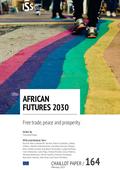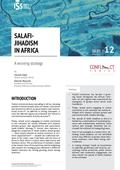You are here

The future Africans want
Introduction
The middle of a pandemic that has stopped the world in its tracks may seem like a surprising time to focus our attention on Africa’s future. Covid-19 has triggered lockdowns and school closures, caused job losses, postponed elections (1) and forced us to fix our gaze on the here and now: on staying healthy today, on putting food on the table today, on protecting people’s rights and dignity today. However, a shock like this pandemic also creates an imperative for strategic foresight.
As Africa prepares for a post-Covid world, we must take stock of people’s lived experiences and expectations if we are to build back better. What are Africans’ aspirations for their lives and those of their children? How are they thinking about the future and what can they do to shape it? What assets are citizens willing to invest to further their collective ambitions, and how can governments and development actors best harness them? This policy Brief taps into Afrobarometer (2) survey data to map people’s aspirations for the next decade and their willingness to take action to achieve their goals (detailed information on Afrobarometer surveys and methods can be found in endnote 2). Rather than using abstract scenarios or models to build a vision of the future, we asked people directly where they want to go and how they think they can get there (3). Our analysis is grounded in the perspectives of ordinary citizens, their views on the interactions they have with their governments and their reports of the actions they take to participate in policy processes and influence their governments, defined as ‘citizen engagement’.
The responses to the surveys show that Africans’ aspirations go well beyond economic and social security: they evince a desire for self-sufficiency and autonomy as well as democratic, accountable and responsive governance. Citizens are largely ready and willing to take action and even to put their own financial resources into the pot in order to realise their ambitions. Examples abound of citizens joining together to do everything: from fighting corruption in the management of local natural resources in Ghana (4), to initiating local awareness-raising and relief campaigns in response to Covid-19 in Cameroon, Kenya, South Africa and South Sudan. (5) Yet too often, governments resist and fail to listen to citizen voices, respond to popular expectations and build the governance systems their people demand.
This leaves an enormous resource— the energy and will of millions of citizens — untapped, a luxury that African governments cannot afford as they look to the future and consider how to achieve the ambitious targets of the United Nations’ Sustainable Development Goals (SDGs) and the African Union’s Agenda 2063. If they are to make effective use of their people’s assets, decision-makers will need to increasingly engage with their publics by opening doors to information sharing and real collaboration. By expanding the space for African voice and agency in all arenas, from problem-solving to policymaking, the power of citizen actions can be unleashed across the continent.
In this opening Brief of the Imagine Africa series, we consider what Africans want their future to look like 10 years down the road and then review current trends in what they say they are getting. The growing gap between ambition and reality discussed in the second and third sections highlights the need for changes in how governments and citizens interact. The fourth section showcases what African citizens can bring to the table in terms of resources, energy, activism and engagement, but also reveals that African governments are not always receptive to these inputs. We conclude with a discussion of what African decision-makers and international supporters can do to more effectively leverage the power of citizen action and engagement.
The future that Africans want
What do Africans want from their governments, their economies and their political systems? Afrobarometer data show that they want to satisfy their basic physical and economic needs, but their aspirations extend well beyond this. Self-sufficiency and autonomy as well as democratic, accountable and responsive governance are all on the popular agenda.
Asked about the ‘most important problems that government should address’ to make their lives better, Africans prioritise jobs and health (both mentioned by 34 % of respondents), followed by infrastructure, education and access to clean water. With development stakeholders warning that the pandemic may have wiped out years of progress in fighting poverty and improving health around the world (6), Covid-19 and its social and economic impacts are likely to reinforce these priorities in the coming decade.
Self-sufficiency and autonomy as well as democratic, accountable and responsive governance are all on the popular agenda.
However, Africans are not looking for handouts; they want to pursue economic and political development through their own resources and on their own terms. When asked whether countries should ‘finance development from their own resources, even if it means paying more taxes’, or should instead rely on external loans, responses outlined a strong preference for self-reliance (66 % vs. 29 %). This does not mean Africans reject international assistance, but they prefer to retain local control. Majorities insist that their governments should make their own decisions about how loans and development assistance are used (54 %) rather than accepting donor restrictions. Fewer than half (46 %) like aid conditionality, even when it is designed to promote goals that Africans ascribe to, such as democracy and protection of human rights.
Africans are more ambitious still: People also voice strong support for democracy and, increasingly, for government accountability. Over the past decade, democracy watchers have been raising the alarm about declining trends in the status of democracy, both globally and in Africa (7). The pandemic has heightened these concerns amidst evidence that some governments may be taking advantage of the situation to not only place temporary restrictions on the public, media houses, the opposition or even elections but to roll back hard-won governance reforms on a more permanent basis (8).
However, popular commitment to democracy and accountable governance remains robust. Across 22 countries where indicators of support for democracy have been tracked for the past decade, preference for democracy is still strong at 72 %, down a modest four percentage points since 2011-2013 (Figure 1). Large majorities consistently support presidential term limits (78 %) and reject authoritarian forms of government such as one-party rule (79 %).
Data: Afrobarometer, 2011-2021
Support for multiparty elections as the best system for selecting leaders has dropped nine percentage points from a high of 85 % in 2011-2013, but remains strong at 76 %. This decline may reflect a growing recognition that elections, especially poor-quality ones, are not enough to guarantee democracy and better governance, and that other critical aspects of democracy such as accountability, participation and responsiveness cannot be overlooked (9).
This interpretation is reinforced by evidence that demand for accountability has climbed steadily. Nearly two-thirds (64 %) now agree that it is more important for a government to be accountable to the people than to ‘get things done’, up 11 percentage points from a decade ago.
In sum, we see that when Africans consider their futures, they aspire not just to fulfil their basic economic and social needs; they desire to live in societies that are self-sufficient and autonomous, and that enjoy democratic, accountable and responsive governance.
What they (don't) get: A widening gap between aspirations and reality
To what extent does daily reality live up to Africans’ expectations and aspirations? Here, the trends suggest greater cause for concern.
Less than a decade ago, popular discourse touted the ‘Africa rising’ narrative. Yet, recent surveys show that most Africans (62 %) say their country is going in the wrong direction, a sharp increase from 47 % in 2011-2013 (Figure 2). Growing numbers also report that the economy is doing badly, and we continue to record high levels of material deprivation. Across 25 countries in 2019-2021, more than half report that they or their family members have had to go without enough food (54 %), enough clean water (56 %), or adequate health care (63 %) in the past year.
Data: Afrobarometer, 2011-2021
On the political front, recent years have been marked by democratic highs — such as Malawi’s re-running of its flawed 2019 presidential election and the ouster of long-serving autocrats in Gambia, Sudan and Zimbabwe — alongside such lows as coups in Mali and attempted coups in Gabon and Niger. On balance, however, popular assessments of the supply of democratic and accountable governance lag behind those for demand and have been declining. Citizen estimates of how democratic their countries are have declined marginally by three percentage points over the past decade (from 57 % to 54 %) (Figure 3). But satisfaction with how democracy works is far lower (43 %), and dropping faster, down 9 points since 2011-2013. And although ratings of election quality have held steady, the level of corruption and the effectiveness of government efforts to fight it are getting worse.
Data: Afrobarometer, 2011-2021
In sum, when we compare indicators of democratic demand and supply, it is evident that there is a consistent deficit of supply and that African states are losing ground when it comes to fulfilling the economic and pro-democracy aspirations of their citizens.
From the people’s perspective, decision-makers are neither doing enough to help citizens meet their daily needs through jobs and adequate health care nor fulfilling their aspirations to live in democratic, effective and accountable societies. The widening gap between aspirations and realities does not bode well for the future, undermining the ability to achieve the SDGs and Agenda 2063 goals, and possibly even threatening socio-political stability in some countries.
Why it matters? Input legitimacy...
Reversing these negative trends should be a core ambition for Africa’s next decade. While this will require the concerted efforts of African leaders and the international community, ordinary Africans can and must play a central role as well. The power of citizen engagement is a critical resource that must be tapped if Africa is going to fulfil its people’s aspirations.
African states are losing ground when it comes to fulfilling the economic and pro- democracy aspirations of their citizens.
Ordinary Africans have not been sitting on the sidelines — they already invest in personal efforts to act as agents of change. Across 34 countries included in Afrobarometer Round 7 (2016-2018), 53 % agree that ‘ordinary people can make a difference in the fight against corruption’. Nearly half (48 %) say they have ‘joined with others to raise an issue’ within the past year, and 38 % say they have taken action when they encountered a problem with government performance. One-third (34 %) have contacted a government or political leader in the past year ‘about some important problem or to give them [their] views’ (10). They are even willing to invest their economic resources by paying more taxes to make their societies more self-reliant (66 %, as mentioned above) and to increase access to services (51 %).
But decision-makers are not always receptive and responsive to citizens. While a slim majority (53 %) of citizens say public officials generally treat them with respect, a sizeable minority (44 %) say they do not. Only 22 % think local government councillors listen ‘to what people like you have to say’. These results suggest that public officials either do not understand or disregard the accountability relationship between citizens and their government. And although many people make an effort to solve problems in their communities, they are often met with inadequate response from their government. For example, while a majority (57 %) say they would probably get a response if they reported a problem such as teacher absenteeism at their local school, more than one in three (36 %) think they would not. And fewer than half (43 %) believe officials would take action if they reported corrupt behaviour. In fact, fully two-thirds (67 %) say they would ‘risk retaliation or other negative consequences’ if they reported incidents of corruption. Upending of the citizen-government accountability relationship by public officials is reinforced by the fact that majorities in 33 out of 34 countries believe they would face retaliation, including more than eight out of 10 citizens in Gabon (88 %), Eswatini (82 %) and Malawi (81 %) (Figure 4) (11).
Preliminary analysis suggests that lack of government responsiveness and respect for citizens may have direct implications for citizen engagement. The more individuals believe (1) that they are respected and listened to by government officials, (2) that they will get a response if they raise an issue and (3) that they do not need to fear retaliation, the more likely they are to contact leaders or take other individual or collective actions to solve their problems and secure their needs. Almost all of these interactions show quite modest but statistically significant positive correlations (12).
Data: Afrobarometer, 2016-2018
In sum, a lack of responsiveness and accountability means governments may deprive themselves of valuable political, social and financial capital as they fail to take advantage of the desire of citizens to participate in their own governance and contribute to — even sacrifice for — their development.
...and optimism about the future
There is evidence that respectful and responsive governance does more than inspire participation; ‘input legitimacy’ is linked to better policy outcomes at the country level. When we compare country averages for responsiveness indicators (e.g. the percentage who report that their governments are respectful and responsive, that their leaders listen and that citizens can act without fear) to key indicators of economic and political conditions that we considered earlier (e.g. the percentage who say the country is going in the right direction and who are satisfied with democracy), we again find positive associations. Countries where more citizens report that government officials treat them with respect and that members of parliament listen to their constituents also tend to report a stronger sense that the country is going in the right direction. The same holds true for countries where responsiveness to reports of corruption is higher and where the risk of retaliation for reporting is lower. Countries where local government councillors listen and where responsiveness is higher also tend to report greater satisfaction with democracy.
Figure 5 illustrates this trend: country ratings of government responsiveness to reports of corruption are significantly and positively associated with a sense that a country is going in the right direction (13). We can see that most countries fall either in the upper right sector, where reported levels of both responsiveness and optimism about the direction of the country are relatively high, or in the lower left sector, where responsiveness and optimism are both much lower. A handful of countries, such as Tanzania, Senegal and Côte d’Ivoire, fall in the upper left. Citizens in these countries maintain a sense of optimism even though their governments are not very responsive, making it clear that responsiveness may contribute to, but is not determinative of, a sense of optimism about a country’s future. However, the lower right sector is all but empty: greater responsiveness is always associated with higher levels of optimism.
In sum, in countries where governments are more respectful of and responsive to their citizens, we are likely to find both greater citizen engagement in solving problems and addressing community needs, and citizens who are more satisfied with their political system and more optimistic about the future. Respectful and responsive governance thus has the potential to trigger voluntarism and spur collective citizen action toward solving critical development problems. These are assets that governments can tap to build the future that Africans want.
How to harness the power of optimism
Looking to the future, how can Africans’ readiness to engage be fostered so that ordinary people can become key drivers of change? What can be done to ensure that citizens have the tools they need, in a safe and open environment that is not just receptive to citizen engagement, but actively encourages it?
One essential ingredient is government openness. The past decade has seen a flowering of transparency and accountability initiatives that promote freedom of and access to information, as well as specific initiatives on participatory budgeting, open public procurement, and contracting and related matters (14). Government transparency can have three main transformational effects that can greatly benefit African societies. First, it reduces information asymmetries and provides citizens with the data they need to advocate for policy change, organise action or peaceful mobilisation (15)
Data: Afrobarometer, 2016-2018
and hold their leaders accountable. Second, transparent and well-regulated processes can protect government actors from pressures to act against the public interest (16). Finally, transparency and accountability can reinforce citizens’ trust, increasing the likelihood of consent and cooperation with government policies (including tax compliance) and ultimately resulting in more effective and sustainable policy implementation (17). Yet, access to information still falls short of citizen expectations across much of the continent. While a majority of Africans assert their right to access information held by public bodies, their ability to do so remains limited (18). For these reasons, commitment to transparency on the part of African governments, and support for transparency and accountability initiatives from the European Union and other international actors, would be productive investments.
In addition, it is essential that citizens have confidence that they can engage with their governments — including raising grievances or reporting misbehaviour or malfeasance — without fear of reprisal. There is a need to ensure that reliable, secure and confidential communication channels are available for citizens to provide feedback, whether through ombudsmen or other means. It is especially important to promote the presence of such mechanisms at the local government level, the locus of most citizen-state interactions. This is another initiative that both African governments and development partners from the EU and elsewhere would do well to invest in. Africans have demonstrated a willingness to risk their lives in support of change through protests and other forms of resistance. Building constructive channels for civic engagement can further unleash Africans’ drive for change.
There are several ways, both direct and indirect, that EU support to Africa can more effectively promote responsive, open and accountable government and engaged, problem-solving citizens. Direct support can be provided to strengthen openness initiatives and advocates in civil society (as mentioned above) but also within governments and within regional and continental inter-governmental bodies such as the African Union’s African Commission on Human and Peoples’ Rights and the Pan-African Parliament, both of which have made openness and access to information part of their platforms. Efforts to promote citizen engagement and to establish protections for citizens who may take risks when they make their voices heard should also be considered for direct support.
Openness and transparency should also become core principles woven into all EU agreements and engagements in Africa.
Openness and transparency should also become core principles woven into all EU agreements and engagements in Africa. Transparency — both between the EU and government or non-government recipients of its support, and between African governments and their citizens — should be a requirement built into every transaction and exchange. At the same time, the EU should be aware of the wide variations across countries revealed in the findings presented here. Understanding diverse country profiles of government openness and responsiveness, as well as citizen engagement, will be essential for targeting and prioritising interventions in order to maximize impact.
By opening the doors — and file cabinets — of government, and facilitating and promoting citizen action, African states and their development partners can increasingly harness the energy and ambition of ordinary citizens. With more access to information, open channels of communication and safe ways to engage, speak out and act, citizens can become full participants— Africa’s best chance for securing its people’s ambitious political and development goals.
References
- See for example International IDEA, ‘Global overview of COVID-19: Impact on elections’, 2020 (https://www.idea.int/news-media/multimedia-reports/ global-overview-covid-19-impact-elections ).
- Afrobarometer is a pan-African, non-partisan survey research network that provides reliable data on African experiences and evaluations of democracy, governance and quality of life. Seven rounds of surveys were conducted in up to 38 countries between 1999 and 2018. As of March 2021, Round 8 surveys (2019-2021) had been completed in 25 countries. Afrobarometer conducts face- to-face interviews in the language of the respondent’s choice with nationally representative samples of 1 200 to 2 400 respondents, which yield country- level results with margins of error of +/-2 to +/-3 percentage points at a 95 % confidence level. All data presented in this policy Brief are taken from Round 7 findings from 34 countries, Round 8 findings from 25 countries, and comparisons over the past decade (dating back to Round 5 in 2011-2013) across 22 countries. The data are weighted to ensure nationally representative samples. When reporting multi- country averages, all countries are weighted equally (rather than in proportion to population size). For more information on Afrobarometer and access to data and publications, go to www.afrobarometer.org.
- Afrobarometer questionnaires with full question texts for all findings reported here can be found at https://afrobarometer.org/surveys-and-methods/ questionnaires.
- Mohammed, A., ‘In Ghana, citizens are leading the charge on government accountability’, Oxfam Politics of Poverty Blog, 5 February 2016 (https:// politicsofpoverty.oxfamamerica.org/in-ghana-citizens-are-leading-the- charge-on-government-accountability/).
- Wickranmanayake, J., ‘Meet 10 young people leading COVID-19 response in their communities’, United Nations Africa Dialogue Series, 3 April 2020 (https:// www.un.org/africarenewal/web-features/coronavirus/meet-10-young-people- leading-covid-19-response-their-communities).
- Bill and Melinda Gates Foundation, ‘Covid-19: A global perspective’, 2020 (https://www.gatesfoundation.org/goalkeepers/report/2020- report/#GlobalPerspective).
- Temin, J., `Democratic trends in Africa in four charts', Perspectives, Freedom House, 17 April 2020 (https://freedomhouse.org/article/democratic- trends-africa-four-charts). See also Repucci, S., `Freedom in the world 2020: A leaderless struggle for democracy', Freedom House, 2020 (https:// freedomhouse.org/report/freedom-world/2020/leaderless-struggle- democracy).
- See for example International Center for Not-for-Profit Law, ‘African government responses to COVID-19: An overview from the COVID-19 civic freedom tracker’, 2020 (https://www.icnl.org/post/analysis/african- government-response-to-covid-19).
- M’Cormack-Hale, F. and Dome, M.Z., ‘Support for elections weakens among Africans; many see them as ineffective in holding leaders accountable’, Dispatch No 425, Afrobarometer, 2021 (https://afrobarometer.org/publications/ ad425-support-elections-weakens-among-africans-many-see-them- ineffective-holding).
- See Logan, C., Sanny, J.A.-N., and Han, K., ‘Who gets involved? Insights on civic engagement in Africa and insights for fostering volunteerism’, Policy Paper No 72, Afrobarometer, 2020 (https://afrobarometer.org/publications/ pp72-who-gets-involved-insights-civic-engagement-africa-and- implications-fostering).
- See Keulder, C., ‘Africans see growing corruption, poor government response, but fear retaliation if they speak out’, Dispatch No 421, Afrobarometer, 2020 (https://afrobarometer.org/publications/ad421-africans- see-growing-corruption-poor-government-response-fear-retaliation-if- they).
- For example, the Pearson’s r coefficient of correlation between ‘local government councillors listen’ and ‘contact a leader’ is 0.174, significant at the 0.01 level. Coefficients for other relationships among the other indicators are smaller, but most are significant and positive.
- Pearson’s r=.462, significant at the .01 level
- Examples include the Open Government Partnership, the Open Budget Surveys and the Open Contracting Data Standard.
- See for example the scenario on peaceful mobilisation by Faleg, G. (ed), ’African Futures 2030: Free trade, peace and prosperity’, Chaillot Paper No. 164, EUISS, 2021, pp. 49-51 and 92-93 (https://www.iss.europa.eu/content/african- futures-2030).
- Open Government Partnership, ‘The skeptic’s guide to open government’, 2018 (https://www.opengovpartnership.org/wp-content/uploads/2018/09/ SKEPTICS-GUIDE_20180710.pdf).
- Ibid.
- Asunka, J., and Logan, C., ‘Access denied: Freedom of information in Africa falls short of public expectations’, Afrobarometer Dispatch 452, 2021. (https:// afrobarometer.org/publications/ad452-access-denied-freedom-information- africa-falls-short-public-expectations).







